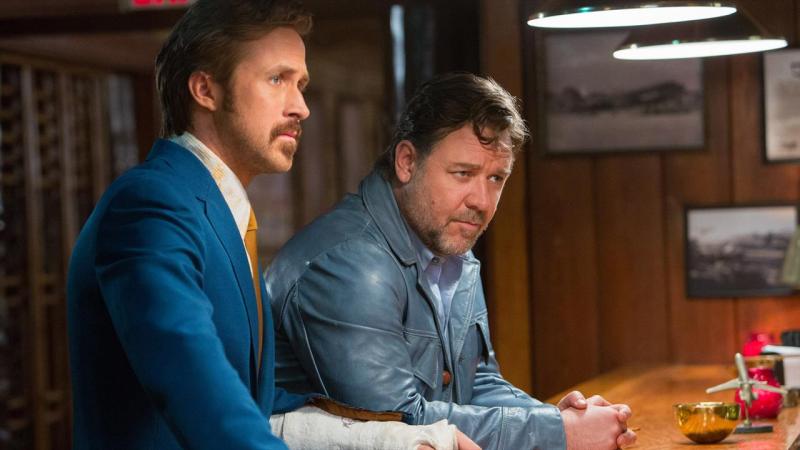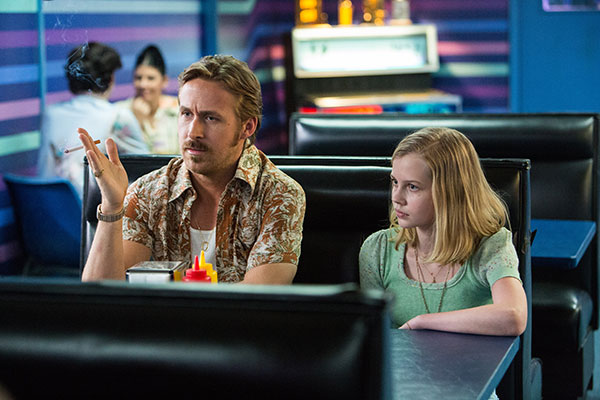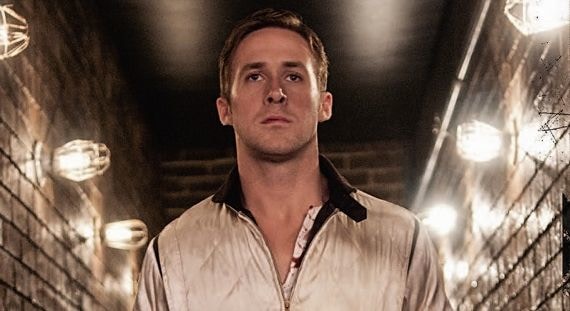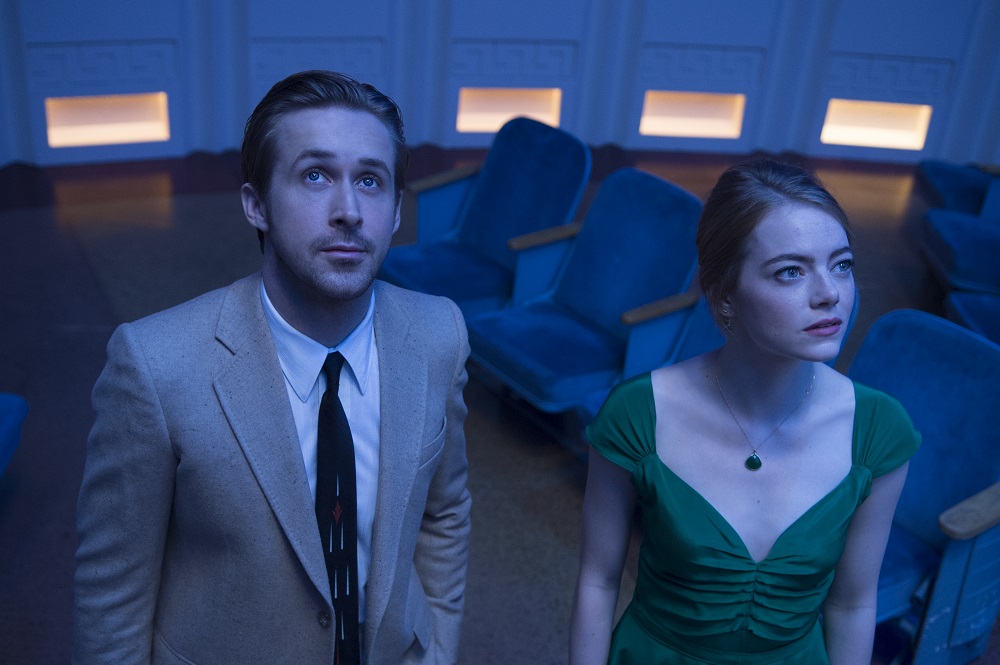The Nice Guys | reviews, news & interviews
The Nice Guys
The Nice Guys
Russell Crowe and Ryan Gosling buddy up to crack jokes, bones and crime in 70s LA

“A porno film where the point was the plot?!” The Nice Guys asks you to make quite a few imaginative leaps: to find Russell Crowe endearing and Ryan Gosling funny and to believe that anyone in 1977 would set out to shoot a skin flick with a storyline. Implausibly, but delightfully, all of the above come to pass in a buddy caper in which Crowe and Gosling partner up to crack jokes, bones and crime in 1970s Los Angeles.
Gosling plays Holland March, a widowed private investigator of low morals and lower ability who exploits confused old ladies for an easy living. He’s hired by one such to locate her missing niece Amelia, until a burly enforcer comes round to his house and encourages him to drop the case by breaking his nose and his arm. The next time March meets Jackson Healy (Crowe) the tables have turned and he’s offering to go into business. Amelia’s mother (Kim Basinger), a bigwig in the justice department, is eager to bring her rebellious daughter in out of harm’s way.
Their odyssey takes them into the neon den of Californian hedonism as Amelia’s activities, it becomes clear, involved participation in a blue movie called How Do You Like My Car, Big Boy? Its star, a buxom pin-up called Misty Mountains, has already died in a spectacular crash at the start of the movie, and the corpses continue to form a disorderly pile, first when the trail takes the two partners to a high-rise hotel from which bodies can be seen tumbling, then at an orgiastic pool party in the Hollywood hills. The plot may be the point of How Do You Like My Car, Big Boy? but, while it keeps the characters on the move, it’s not exactly central to The Nice Guys. It involves, for the record, the criminal involvement of the car industry in a secret plan to thwart the green lobby. The pleasures are mostly to do with the rambunctious, knockabout antics of the two improvising male leads as they variously flirt and threaten their way through the immoral maze of the case. Crowe channels his drizabone inner Ocker to punch first and reflect later, and makes a lovely foil for Gosling’s hyperactive mugging. One delicious little sequence finds him ambushed in the john, attempting to keep his dignity with a girlie magazine over his privates. Somehow Gosling, hitherto the most straight-faced Hollywood lead of his generation, manages to make it extraordinarily funny.
The plot may be the point of How Do You Like My Car, Big Boy? but, while it keeps the characters on the move, it’s not exactly central to The Nice Guys. It involves, for the record, the criminal involvement of the car industry in a secret plan to thwart the green lobby. The pleasures are mostly to do with the rambunctious, knockabout antics of the two improvising male leads as they variously flirt and threaten their way through the immoral maze of the case. Crowe channels his drizabone inner Ocker to punch first and reflect later, and makes a lovely foil for Gosling’s hyperactive mugging. One delicious little sequence finds him ambushed in the john, attempting to keep his dignity with a girlie magazine over his privates. Somehow Gosling, hitherto the most straight-faced Hollywood lead of his generation, manages to make it extraordinarily funny.
There’s the added joy of Angourie Rice (pictured above with Gosling) as March’s wise-beyond-her-years 12-year-old daughter Holly, who tags along resourcefully even when the bullets fly, which in the final third of the film they do with a certain stylised relentlessness. Happily, scriptwriters Anthony Bagarozzi and Shane Black, who also directs with a florid eye for killer sight gags, are far more interested in the winning flaws of their heroes and even their villains. Their script taps into a spirit of exuberant cynicism. “Marriage is buying a house for someone you hate,” says Crowe. Plenty of zingers where that came from. The Nice Guys is one of the most pleasurable lessons in screen chemistry since Robert de Niro and Charles Grodin crossed America in Midnight Run.
RYAN GOSLING'S FILMOGRAPHY
Blue Valentine (2010). A controversial break-up melodrama sees things from the male point of view
 Drive (2011). Ryan Gosling's brilliant, bruising ride into LA darkness (pictured)
Drive (2011). Ryan Gosling's brilliant, bruising ride into LA darkness (pictured)
Crazy, Stupid, Love (2011). Ryan Gosling teaches Steve Carell how to score in a film that doesn't
The Ides of March (2011). George Clooney's star-packed morality tale superbly anatomises political chicanery
The Place Beyond the Pines (2013). Derek Cianfrance and Ryan Gosling follow Blue Valentine with an epic tale of cops and robbers
Gangster Squad (2013). Ruben Fleischer swaps zombies for gangsters with mixed results
 Only God Forgives (2013). Nicolas Winding Refn and Ryan Gosling follow Drive with a simmering tale of vengeance
Only God Forgives (2013). Nicolas Winding Refn and Ryan Gosling follow Drive with a simmering tale of vengeance
The Big Short (2015). Director Adam McKay successfully makes a drama out of a crisis
The Nice Guys (2016). Russell Crowe and Ryan Gosling buddy up to crack jokes, bones and crime in 70s LA
La La Land (2017). Ryan Gosling and Emma Stone (pictured above) will have you floating out of the cinema on a cloud
Overleaf: watch the trailer to The Nice Guys
“A porno film where the point was the plot?!” The Nice Guys asks you to make quite a few imaginative leaps: to find Russell Crowe endearing and Ryan Gosling funny and to believe that anyone in 1977 would set out to shoot a skin flick with a storyline. Implausibly, but delightfully, all of the above come to pass in a buddy caper in which Crowe and Gosling partner up to crack jokes, bones and crime in 1970s Los Angeles.
Gosling plays Holland March, a widowed private investigator of low morals and lower ability who exploits confused old ladies for an easy living. He’s hired by one such to locate her missing niece Amelia, until a burly enforcer comes round to his house and encourages him to drop the case by breaking his nose and his arm. The next time March meets Jackson Healy (Crowe) the tables have turned and he’s offering to go into business. Amelia’s mother (Kim Basinger), a bigwig in the justice department, is eager to bring her rebellious daughter in out of harm’s way.
Their odyssey takes them into the neon den of Californian hedonism as Amelia’s activities, it becomes clear, involved participation in a blue movie called How Do You Like My Car, Big Boy? Its star, a buxom pin-up called Misty Mountains, has already died in a spectacular crash at the start of the movie, and the corpses continue to form a disorderly pile, first when the trail takes the two partners to a high-rise hotel from which bodies can be seen tumbling, then at an orgiastic pool party in the Hollywood hills. The plot may be the point of How Do You Like My Car, Big Boy? but, while it keeps the characters on the move, it’s not exactly central to The Nice Guys. It involves, for the record, the criminal involvement of the car industry in a secret plan to thwart the green lobby. The pleasures are mostly to do with the rambunctious, knockabout antics of the two improvising male leads as they variously flirt and threaten their way through the immoral maze of the case. Crowe channels his drizabone inner Ocker to punch first and reflect later, and makes a lovely foil for Gosling’s hyperactive mugging. One delicious little sequence finds him ambushed in the john, attempting to keep his dignity with a girlie magazine over his privates. Somehow Gosling, hitherto the most straight-faced Hollywood lead of his generation, manages to make it extraordinarily funny.
The plot may be the point of How Do You Like My Car, Big Boy? but, while it keeps the characters on the move, it’s not exactly central to The Nice Guys. It involves, for the record, the criminal involvement of the car industry in a secret plan to thwart the green lobby. The pleasures are mostly to do with the rambunctious, knockabout antics of the two improvising male leads as they variously flirt and threaten their way through the immoral maze of the case. Crowe channels his drizabone inner Ocker to punch first and reflect later, and makes a lovely foil for Gosling’s hyperactive mugging. One delicious little sequence finds him ambushed in the john, attempting to keep his dignity with a girlie magazine over his privates. Somehow Gosling, hitherto the most straight-faced Hollywood lead of his generation, manages to make it extraordinarily funny.
There’s the added joy of Angourie Rice (pictured above with Gosling) as March’s wise-beyond-her-years 12-year-old daughter Holly, who tags along resourcefully even when the bullets fly, which in the final third of the film they do with a certain stylised relentlessness. Happily, scriptwriters Anthony Bagarozzi and Shane Black, who also directs with a florid eye for killer sight gags, are far more interested in the winning flaws of their heroes and even their villains. Their script taps into a spirit of exuberant cynicism. “Marriage is buying a house for someone you hate,” says Crowe. Plenty of zingers where that came from. The Nice Guys is one of the most pleasurable lessons in screen chemistry since Robert de Niro and Charles Grodin crossed America in Midnight Run.
RYAN GOSLING'S FILMOGRAPHY
Blue Valentine (2010). A controversial break-up melodrama sees things from the male point of view
 Drive (2011). Ryan Gosling's brilliant, bruising ride into LA darkness (pictured)
Drive (2011). Ryan Gosling's brilliant, bruising ride into LA darkness (pictured)
Crazy, Stupid, Love (2011). Ryan Gosling teaches Steve Carell how to score in a film that doesn't
The Ides of March (2011). George Clooney's star-packed morality tale superbly anatomises political chicanery
The Place Beyond the Pines (2013). Derek Cianfrance and Ryan Gosling follow Blue Valentine with an epic tale of cops and robbers
Gangster Squad (2013). Ruben Fleischer swaps zombies for gangsters with mixed results
 Only God Forgives (2013). Nicolas Winding Refn and Ryan Gosling follow Drive with a simmering tale of vengeance
Only God Forgives (2013). Nicolas Winding Refn and Ryan Gosling follow Drive with a simmering tale of vengeance
The Big Short (2015). Director Adam McKay successfully makes a drama out of a crisis
The Nice Guys (2016). Russell Crowe and Ryan Gosling buddy up to crack jokes, bones and crime in 70s LA
La La Land (2017). Ryan Gosling and Emma Stone (pictured above) will have you floating out of the cinema on a cloud
Overleaf: watch the trailer to The Nice Guys
rating
Explore topics
Share this article
The future of Arts Journalism
You can stop theartsdesk.com closing!
We urgently need financing to survive. Our fundraising drive has thus far raised £49,000 but we need to reach £100,000 or we will be forced to close. Please contribute here: https://gofund.me/c3f6033d
And if you can forward this information to anyone who might assist, we’d be grateful.

Subscribe to theartsdesk.com
Thank you for continuing to read our work on theartsdesk.com. For unlimited access to every article in its entirety, including our archive of more than 15,000 pieces, we're asking for £5 per month or £40 per year. We feel it's a very good deal, and hope you do too.
To take a subscription now simply click here.
And if you're looking for that extra gift for a friend or family member, why not treat them to a theartsdesk.com gift subscription?
more Film
 theartsdesk Q&A: director Kelly Reichardt on 'The Mastermind' and reliving the 1970s
The independent filmmaker discusses her intimate heist movie
theartsdesk Q&A: director Kelly Reichardt on 'The Mastermind' and reliving the 1970s
The independent filmmaker discusses her intimate heist movie
 Blu-ray: Wendy and Lucy
Down-and-out in rural Oregon: Kelly Reichardt's third feature packs a huge punch
Blu-ray: Wendy and Lucy
Down-and-out in rural Oregon: Kelly Reichardt's third feature packs a huge punch
 The Mastermind review - another slim but nourishing slice of Americana from Kelly Reichardt
Josh O'Connor is perfect casting as a cocky middle-class American adrift in the 1970s
The Mastermind review - another slim but nourishing slice of Americana from Kelly Reichardt
Josh O'Connor is perfect casting as a cocky middle-class American adrift in the 1970s
 Springsteen: Deliver Me From Nowhere review - the story of the Boss who isn't boss of his own head
A brooding trip on the Bruce Springsteen highway of hard knocks
Springsteen: Deliver Me From Nowhere review - the story of the Boss who isn't boss of his own head
A brooding trip on the Bruce Springsteen highway of hard knocks
 The Perfect Neighbor, Netflix review - Florida found-footage documentary is a harrowing watch
Sundance winner chronicles a death that should have been prevented
The Perfect Neighbor, Netflix review - Florida found-footage documentary is a harrowing watch
Sundance winner chronicles a death that should have been prevented
 Blu-ray: Le Quai des Brumes
Love twinkles in the gloom of Marcel Carné’s fogbound French poetic realist classic
Blu-ray: Le Quai des Brumes
Love twinkles in the gloom of Marcel Carné’s fogbound French poetic realist classic
 Frankenstein review - the Prometheus of the charnel house
Guillermo del Toro is fitfully inspired, but often lost in long-held ambitions
Frankenstein review - the Prometheus of the charnel house
Guillermo del Toro is fitfully inspired, but often lost in long-held ambitions
 London Film Festival 2025 - a Korean masterclass in black comedy and a Camus classic effectively realised
New films from Park Chan-wook, Gianfranco Rosi, François Ozon, Ildikó Enyedi and more
London Film Festival 2025 - a Korean masterclass in black comedy and a Camus classic effectively realised
New films from Park Chan-wook, Gianfranco Rosi, François Ozon, Ildikó Enyedi and more
 After the Hunt review - muddled #MeToo provocation
Julia Roberts excels despite misfiring drama
After the Hunt review - muddled #MeToo provocation
Julia Roberts excels despite misfiring drama
 London Film Festival 2025 - Bradley Cooper channels John Bishop, the Boss goes to Nebraska, and a French pandemic
... not to mention Kristen Stewart's directing debut and a punchy prison drama
London Film Festival 2025 - Bradley Cooper channels John Bishop, the Boss goes to Nebraska, and a French pandemic
... not to mention Kristen Stewart's directing debut and a punchy prison drama
 Ballad of a Small Player review - Colin Farrell's all in as a gambler down on his luck
Conclave director Edward Berger swaps the Vatican for Asia's sin city
Ballad of a Small Player review - Colin Farrell's all in as a gambler down on his luck
Conclave director Edward Berger swaps the Vatican for Asia's sin city
 London Film Festival 2025 - from paranoia in Brazil and Iran, to light relief in New York and Tuscany
'Jay Kelly' disappoints, 'It Was Just an Accident' doesn't
London Film Festival 2025 - from paranoia in Brazil and Iran, to light relief in New York and Tuscany
'Jay Kelly' disappoints, 'It Was Just an Accident' doesn't

Add comment